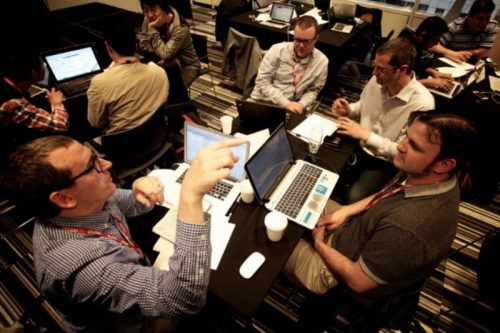“Call me a utopian but I imagine a new educational ecology where students may take courses from anywhere and instructors may select any students, where courses are collaborative and public, where creativity is nurtured as Google nurtures it, where making mistakes well is valued over sameness and safety, where education continues long past age 21, where tests and degrees matter less than one’s own portfolio of work, where the gift economy may turn anyone with knowledge into teachers, where the skills of research and reasoning and skepticism are valued over the skills of memorization and calculation, and where universities teach an abundance of knowledge to those who want it rather than manage a scarcity of seats in a class.” – Jeff Jarvis in Hacking Education
This is a powerful vision that provides a different scenario of how education should unfold itself in our lives. Immediately these words make us evaluate our own experience. What do we wish could have been different? What would we change?
School is oftentimes associated with obligation and boredom. Some kids love going to school, but for the average child, sitting on a desk, silently, listening to a lesson in which the content given tends to be abstract and intangible, is not quite the idea of fun. Which makes us wonder, what if learning methods would have motivated creativity, individuality and curiosity?
School can be scary at times. Exams, pop quizzes and other forms of evaluation are intimidating. Mistakes are quantified and penalized. Wrong answers can’t be undone. The grade we receive indicates whether we are competent or not, and once it is on the report card, there’s no turning back. Although there are several exams, which give opportunity to improve and even though these assessments are a precise measure of progress, it is simplistic, centralized and has the potential of generating rejection and apprehension to keep learning. “I always get a C- in Math. I’m not good at it and it will always be this way”.
One single answer questions are usually the norm in school, which leaves no room for research, discussion or debate -skills that are fundamental in a democratic society. Yes, correct answers must be taught, but the why, the reasons behind them must be thoroughly explained as well. Human beings are not meant to function as robots. We should not repeat inamovible information without breaking the mold. We are meant to reflect, scrutinize, interpret and reason.
Once the graduation day passes, students no longer consider themselves as such. It is a period of their lives which has reached its end. This conception finds its explanation in part, because education tends to be related to a physical place, i.e the school or university. This conception needs to be changed. As long as we’re human beings, we have the capacity to observe, absorb and reflect, and thus count with the rational tools to keep learning during all our lives no matter where we go. We don’t need to attend class in an institute to get education on a long term. We need to keep learning wherever we are. Education has no expiration date.
Technology is in the midst of producing a paradigmatic change in how we experience education. It has the potential to positively transform traditional institutions, as well as igniting new complementary forms. Schools and universities can use technology and the Internet to make education more personalized, flexible and accessible. Simultaneously, we have witnessed the origin of new platforms where learning and teaching is a collaborative process involving people from all over the world.
In order to make this initial vision come true, we first have to recognize our faults, correct them and use all resources available to advance the changes in the education ecology we want next generations to see.
Want a sample of this new experience? Go to Teachlr.




